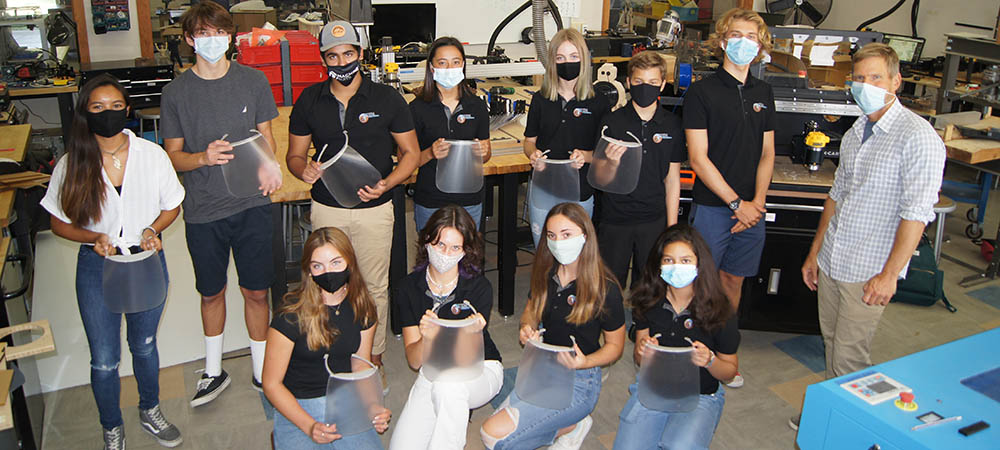
(Photo Credit: STEMbassadors/Ventura Unified School District)
California Forward is committed to advancing policy intersections that create a more inclusive and sustainable California where all people can prosper. To move this forward, we must reimagine a state where we address the racial and geographic inequities that have been exacerbated by a public health and economic crisis, and we must answer the call to dismantle structural racism. The Voices of Shared Prosperity series amplifies the stories of Californians who are committing their time and talent to solutions that embrace equity, environmental sustainability, and economic opportunity.
In order to teach young people, you need to be able to reach them.
And “reaching them” is what Alex Wulff has been doing for a quarter of a century in Southern California.
You may remember Alex: He and his students and their STEMbassadors nonprofit won a statewide award at the California Economic Summit last fall for using 3D printers to create protective face shields for the hospitals in Ventura County during the height of the COVID-19 pandemic.
Wulff tells us the idea for this came from his students. His project-based curriculum approach has been inspiring students just about since he started teaching.
“I could never have imagined becoming a teacher,” he said. “I hated school. It wasn’t relevant.”
Yet, when Wulff finished college, he wasn’t sure what to do with himself.
He heard an ad on the radio that the L.A. Unified School District was looking for teachers who could teach in the inner city. So, he took the CBEST test and was hired at Windsor Hills Elementary, then a Los Angeles school with a mostly Black student population.
Two weeks into his new job he knew that he wasn’t reaching his students and he thought, “I can’t do this.”
About the same time, he and his wife were at an outlet mall when he saw a store that was selling some small rockets. They were $5 apiece and he asked his wife about purchasing them for his class. Though the family was on a tight budget, she replied, “Buy them.”
He brought them to class and told his students they were going to build and launch the kits. But they had to earn that. He created a project-based curriculum that included a map of the solar system and supporting reading activities and, as he said, “the class was transformed.”
So was the teacher.
He soon moved to Ventura County and kept teaching in what he called “high-poverty schools” and has continued to teach not out of books but from student experience.
“Technology allows you to be a creative teacher,” Wulff said.
Twenty years ago, he had 4th and 5th graders designing and engineering robots. Today, they might be building wind turbines from the ground up and other real-world projects.
He looks at his job the way any Silicon Valley entrepreneur does.
“I’ve had to find a way to raise money in order to innovate,” he said.
He would (and still does) write grants to raise the money to buy 3D printers, affordable lasers and the like. He’s been awarded 1,000 grants and has applied for a lot more. He also gets donations from interested partners — like local businesses who see the value not only of the students being inspired to do great things but also the positive effect their work has — like building face shields when local hospitals couldn’t find enough themselves.
Thanks to those efforts, his classroom is full of cutting-edge technology.
Wulff turns 50 this year and tries to stay in touch with many of his early students who have gone onto careers in engineering and technology.
“It helps me stay up on things,” said Wulff.
It’s about at this point where you may wonder, “Why we can’t have more teachers like Alex Wulff?”
“There should be a whole new generation of tech savvy teachers coming online,” he said. “Education should be evolving, but it is not.”
He describes education as a system of requirement box-checking and that teachers are being discouraged from being different and are constantly being told teach a certain way.
“It’s a risk averse system that is a disservice to today’s students,” he said.
Since he’s been so successful, it seemed appropriate to ask him what he would do to change education to achieve the results we all want.
“Hire talented people, give them the freedom to be creative and hold them accountable for results,” he said. “And, one more thing, pay them more if they are successful.”
Dr. Richard Rutherford is director of quality and safety for the Ventura County Medical Center and Santa Paula Hospitals and benefited last year from this hands-on, experience-based instruction, as Wulff’s students constructed face shields for health care workers in the region.
“We should be asking how do we get more people like Alex into education.” Rutherford told us last year.
Seems like the right question.

